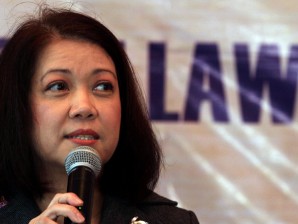Party-list ruling detrimental to marginalized–Sereno
MANILA, Philippines—Chief Justice Ma. Lourdes Sereno disagreed with the majority decision of the Supreme Court that opened the party-list system to national, regional and sectoral parties and organizations that do not represent marginalized and underrepresented sectors.
Sereno aired her views in a separate opinion after she and Justice Bienvenido Reyes were outvoted by 10 justices who granted the petitions for review of 54 party-list groups and set six new “parameters” that the Commission on Elections should observe when it rescreens the party-list groups.
“I believe the ponencia (majority decision) may have further marginalized the already marginalized and underrepresented of this country. In the guise of political plurality, it allows national and regional parties or organizations to invade what should be constitutional and statutorily protected space. [It] fails to appreciate that the party-list system is not about mere political plurality, but plurality with a heart for the poor and disadvantaged,” said Sereno in her 22-page opinion.
The Supreme Court public information office clarified the justices did not vote on each of the parameters. The PIO said the “votes” recorded in the case summary it released to the media pertained to the positions aired by the justices in the marginal notes beside their signatures on the main decision and on the separate opinions they wrote or supported.
Article continues after this advertisement
Disagreeing with parameters
Article continues after this advertisementThe Chief Justice disagreed with three of the parameters, particularly the second which opened the party-list system to national, regional and sectoral parties or organizations that do not represent marginalized and underrepresented sectors.
Sereno said the party-list system was “primarily a tool for social justice.” She said Republic Act No. 7941, or the Party-List System Act of 1995, was crafted in line with constitutional provisions (Section I, Article XIII) which mandates Congress to give highest priority to enacting measures that “reduce social, economic and political equalities, and remove cultural inequities by equitably diffusing wealth and political power for the common good.”
Social justice was the underlying philosophy of the drafters of the Charter as shown by the records of their proceedings, she said, adding that the party-list system was intended as “a countervailing means for the weaker segments of our society to overcome the preponderant advantages of the more entrenched and well-established political parties.”
However, Justice Arturo Brion, who voted with the majority, said Sereno’s position was “totally incorrect.”
‘Not to create policy’
He defended the majority decision: “The business and principal function of this Court is not to create policy or to supplant what the Constitution and the law expressly provide. This Court and its members cannot likewise act as advocates, even for social justice for, any ideology for that matter, as advocacy is not the task assigned to us by the Constitution,” he said.
For Brion, the party-list system as defined in the Constitution is one that is primarily grounded on electoral reform and one that was “principally driven” by electoral objectives.
The party-list system, he explained, aimed to benefit “those who were marginalized in the legislative district elections because they could not be elected in the past for lack of the required votes and specific constituency in the winner-take-all legislative district contest, and who, by the number of votes they garnered as 3rd or 4th placer in the district elections, showed that nationally they had the equivalent of what the winner in the legislative district would garner.”
This was how the concepts of “marginalized and underrepresented” and the “lack of political constituency” found its way into the Constitution and RA 7941.
Justice Bienvenido Reyes, who, like Sereno, is an appointee of President Aquino, sided with the Chief Justice on the party-list system being “a social justice tool.”
“It is not simply a mechanism for electoral reform. To simply regard it as a mere procedure for reforming the already working and existing electoral system is a superficial reading of RA 7941 and the Constitution, from which the law breathed life. The idea is that by promoting the advancement of the underprivileged and allowing them an opportunity to grow, they can rise to become partners of the State in pursuing greater causes,” Reyes said in his own separate opinion.
The other Aquino appointee, Justice Marvic Leonen, did not dwell on the “social justice versus electoral reform issue” but agreed with the majority that the “marginalized and underrepresented” requirement should be done away with because it was “too ambiguous” and subject to abuse.
“We [must] maintain full fealty to the textual content of our Constitution. It is ‘a party-list system of registered national, regional, and sectoral parties or organizations.’ Nothing more, nothing less,” he said.
